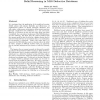Free Online Productivity Tools
i2Speak
i2Symbol
i2OCR
iTex2Img
iWeb2Print
iWeb2Shot
i2Type
iPdf2Split
iPdf2Merge
i2Bopomofo
i2Arabic
i2Style
i2Image
i2PDF
iLatex2Rtf
Sci2ools
120
click to vote
SIGMOD
1999
ACM
1999
ACM
Belief Reasoning in MLS Deductive Databases
It is envisaged that the application of the multilevel security (MLS) scheme will enhance exibility and e ectiveness of authorization policies in shared enterprise databases and will replace cumbersome authorization enforcement practices through complicated view de nitions on a per user basis. However, as advances in this area are being made and ideas crystallized, the concomitant weaknesses of the MLS databases are also surfacing. We insist that the critical problem with the current model is that the belief at a higher security level is cluttered with irrelevant or inconsistent data as no mechanism for attenuation is supported. Critics also argue that it is imperative for MLS database users to theorize about the belief of others, perhaps at di erent security levels, an apparatus that is currently missing and the absence of which is seriously felt. The impetus for our current research is this need to provide an adequate framework for belief reasoning in MLS databases. We demonstrate t...
| Added | 03 Aug 2010 |
| Updated | 03 Aug 2010 |
| Type | Conference |
| Year | 1999 |
| Where | SIGMOD |
| Authors | Hasan M. Jamil |
Comments (0)

